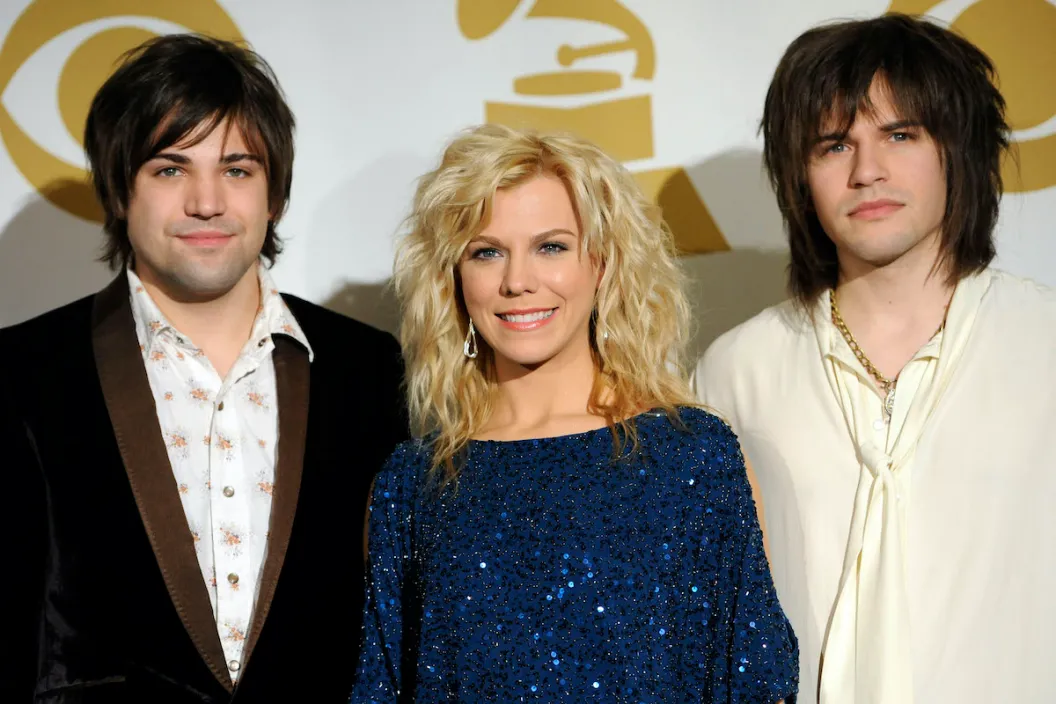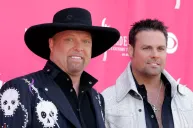The Band Perry's Reid Perry, Neil Perry and Kimberly Perry released "Live Forever" on Aug. 14, 2015. It was supposed to be the introduction of a new, big sound from their work with pop producer RedOne (Lady Gaga), and it was the first single after parting ways with Scott Borchetta and Big Machine. For most people, it was a bit of a head-scratcher. Were they going to ditch the rootsy sound that made them famous and release their first pop album?
For starters, it was the complete opposite of their six-times platinum country radio debut turned crossover hit "If I Die Young." I mean, just comparing the titles "If I Die Young" versus "Live Forever" is enough to tell you how much of a 180 they pulled.
But even if it confused the casual critic, "The Fans Perry" were on board with potential pop singles. It was still, after all, anchored by Kimberly's smoky vocals and an undeniable catchiness which made the trio other hits as memorable as All Your Life" and "Postcard from Paris" from their debut and "Better Dig Two" and "Done" from second album Pioneer. The ACM award-winning country stars know music, and we were all willing to wait and see what they could do. But an entire album of pop music? Could they successfully go the Taylor Swift way after only two country albums?
Then the song got pulled from radio and disappeared from the Internet for about 24 hours, an occurrence Kimberly Perry attributed to their team doing "a little housecleaning." This move sent fans overboard on social media, wondering if the country music band was breaking up.
So they got together to assure their fans with a video posted to Facebook that they were indeed not going anywhere, and they wanted to cuddle every last one of them. It was pretty cute but still carried some curious undertones.
Of course, now we know that the content was being re-uploaded with the band's ownership instead of Big Machine's. It's why the single "Live Forever" has The Band Perry's copyright while all of their prior chart-topping works have the Big Machine Label Group copyright.
But none of that really answers the simple question of "What happened?" Sure, artists get dropped from labels all the time. But not artists like The Band Perry. Only two albums into their career, the sibling trio had already amassed a vast following. Their debut record from 2010 has outsold Luke Bryan's first two records combined. They've worked with some of the top producers in the game, including Rick Rubin and Dann Huff.
They've had four No. 1 singles, another four land in the top 10, and in 2014 they won a Grammy award for their rendition of Glen Campbell's classic, "Gentle On My Mind."
So is one under-performing single really a reason to split with a band?
Some speculated that Big Machine and The Band Perry weren't on the same page when it came to their sonic direction — but Big Machine is certainly not opposed to a poppy sound, and The Band Perry, self-proclaimed "pop tarts," were never far removed from pop in general (even "If I Die Young" was a crossover adult contemporary hit when they replaced the fiddle with guitar).
Big Machine had several pop acts on its roster, and The Band Perry had all that time with aforementioned producer RedOne. There's no doubt that both parties are on board with pop — if The Band Perry were a new band.
But they're not. They're an established band with an established sound, and Big Machine is not in the business of breaking a new sound for an established artist.
They are, however, in the business of breaking new, young acts. That's why more than one-third of Big Machine's roster is young acts who have yet to have a radio hit. Now, that's not to say the acts have a lot of time to get one — young artists get dropped quicker than the beat on a Sam Hunt single.
And that's really what the big labels are interested in now. Just imagine the near desperation in Sony Nashville CEO Randy Goodman's voice when he tells Billboard that "We [Sony] haven't been able to break any acts through to help offset that decay [of aging artists]. That, to me, is the most urgent thing that needs to be done."
And here's Goodman talking about signing new act LANCo on the spot at their label showcase: "When we show up, it needs to be, 'Wow, the Sony guys are here tonight. They may sign this act tonight.' So that's what we did. I think I freaked my entire staff out, as well as the band, but for the staff, I wanted them to see that if they tell me they're excited about this, and I'm excited about it, I'm willing to walk backstage and just throw down."
That's why Sony went so aggressively after Maren Morris, who was about to sign with a different label.
Morris tells Billboard: "It was a very aggressive offer. They promised a lot of amazing things to us, and luckily everything has pulled through. We've not been shelved or waited for a single release date. Everything has honestly been moved earlier, so I feel like everyone over there has been really great about holding up their end of the bargain."
It was a happy beginning for Morris, but she brings up excellent points about the struggles that a lot of artists deal with: broken promises, shelved records and lapsed support. In The Band Perry's case, the plug was pulled on their single, and their album was delayed (and still is).
Again — labels are not interested in a new sound for an established act.
That's why Big Machine Label Group's collective roster at the time largely consisted of a few modern superstars, legacy artists and a bunch of people you've likely never heard of. And the truth is, several of them you probably never will because they'll get dropped within the year.
But a group like The Band Perry has some weight they can throw around when it comes to negotiating contracts and their future. Their machine also requires a lot more money to activate — more money for recording, more money for marketing, more money for touring.
So if Big Machine wasn't entirely on board with the direction The Band Perry was heading, they'd be putting a lot of money towards something they don't necessarily believe in — for, potentially, less reward.
Instead, Big Machine can just throw their name and preliminary radio support behind several new artists, all of whom are likely tied down to unfavorable contracts pending their success. Granted, only a few will break that radio barrier.
But it's really not bad for The Band Perry. They were hustling for ten years before inking a big deal, and much of their success came from the way Big Machine was able to put them on the top of the pile. Now, being free from label obligations, it's just a matter of them and their team being calculated in their next steps to get on top of that pile again.
Heck, only a few hours after the label split announcement, they brought more than 50,000 screaming fans to their feet as they opened Rodeo Houston.
Read More: Jerry Lee Lewis Songs: The 10 Best Songs by 'The Killer'
So many young artists seek label deals because they don't have the resources to make their mark otherwise. The Band Perry got to be among the cool, independent kids again when they released new music while still operating with the big boys.
The band jumped into the limelight again with their single "The Good Life." The new song is pretty much all about Kimberly's divorce from J.P. Arencibia, a former MLB player. The song alleges his infidelity during their marriage, which he has denied. Arencibia even went as far as to say she made up the infidelity to revive her dying career with clickbait. Yikes. The song just went to show that gone were the days when we'd see The Band Perry on the country charts at No. 1.
After releasing a country single, "Comeback Kid," and announcing a proposed third album in 2017, My Bad Imagination, the album was scrapped, and The Band Perry signed with yet another label. The following year, the siblings released the 2018 EP Coordinates with new label Ten Twenty Six. After that release, Kimberly finally opened up on why the siblings decided to leave country. She told Rolling Stone in 2018 that with the new emergence of bro-country with groups like Flordia Georgia Line hitting it big after their second album, they didn't have as much creative freedom with their music.
"We bought out. We paid a hefty price, financially," she says. "Actually buying our way out of fame and the comfort of the trajectory to be able to protect integrity, art, and what I think brought us to the dance in the first place — which is being ourselves."
This post was previously written on March 7, 2016 by Jeremy Burchard but has since been updated.
Now Watch: 10 of Charley Pride's Best Songs




